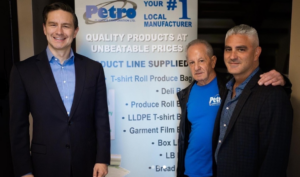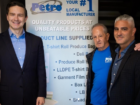
From left: Conservative Party leader Pierre Poilievre, Ed Barkel, and Steve Barkel on the Petro Plastics shop floor. Photo Credit: Petro Plastics Corp. Ltd.
Most wars are ultimately about progress vs. reaction – that’s to say, one side nearly always stands for moving forwards, the other for going backwards. And in the battle for plastics currently being waged in Canada, the anti-plastics side is definitely for going back – back to making products from materials like paper, glass, and steel, that don’t deliver as well as plastic while also being more expensive and environmentally damaging. And unfortunately, this side is being led by none other than our current federal government, which has committed Canada to a “Zero Plastic Waste by 2030” crusade.
It’s an existential crisis, but our industry is fighting back – winning a few skirmishes and losing a few – and a consistent participant on the pro-plastics side from the beginning has been Woodbridge, Ont.-based bag maker Petro Plastics Corp. Ltd. The family-owned and operated firm was founded in 1987 by four partners, including Morris Freedman and Ed Barkel, the grandfather and father respectively, of current owners Steve and David Barkel, and has been a plastic bag maker from day one. As the company’s name indicates, it doesn’t shy away from the fact that its products derive from the petroleum industry. “It’s who we are,” Steve Barkel said. “We make a wide range of plastic bags – everything from food-grade bread bags and deli bags to small bags for dried fruit or nuts to drycleaning bags to big industrial bags you can use to cover heavy machinery – and also food-grade films and anti-static films.” The company currently has two locations in the Greater Toronto Area – one of which doubles as a warehouse – with approximately 36 workers and 11 extrusion lines and 8 bag machines, and also has 2 new converting machines and a new extruder ordered and in the process of being delivered.
AN EARLY SALVO
Petro Plastics involvement in the war on plastics goes back almost 15 years. In June 2012, Toronto City Council voted to ban plastic shopping bags effective Jan. 1, 2013 – which would have made it the first major Canadian city to do so – and then backed off several months later, after being hit with lawsuits and other responses from the plastics industry, which Petro Plastics was involved in. “Along with other companies, we worked with Joe Hruska, who was then with the Canadian Plastics Industry Association, to fight back against this ban, and helped create a campaign that included over 1,000 Torontonians writing councillors with their objections to the ban,” Steve Barkel said. “I wrote to City Hall objecting to the ban – and giving reasons why – and also walked around downtown Toronto with groceries taped to my chest to draw attention to the issue of what would happen without plastic grocery bags. We pointed out the facts – which City Council couldn’t refute – about the unintended negative environmental impacts of a plastic bag ban.”
The company then settled back into a business-as-usual mode, and business remained good, Steve Barkel said, until 2022, when the federal government hit the industry with the one-two punch of adding plastic manufacturing to the list of “toxic” substances in Schedule 1 of the Canadian Environmental Protection Act (CEPA); which paved the way for the federal environment minister to proceed with regulations to ban single-use plastic items nationally, including plastic checkout bags, cutlery, foodservice ware made from or containing problematic plastics, ring carriers, stir sticks, and straws. “As a bag maker, these two steps taken by the government threatened to ruin us,” Steve Barkel said. “Grocery store bags comprised 40 per cent of our business, and the ban threatened all of that.”
UNWOUNDED WARRIOR
So, when the hammer dropped and the ban on the sale or offer of plastic shopping bags across Canada took effect on Dec. 20, 2023, Petro Plastics had a choice to make. “A lot of our competition shut down their lines and, in some cases, went bankrupt,” Steve Barkel said. Faced with the prospect of significant job losses, pay cuts, and having to throw out several hundred thousand dollars’ worth of machinery – some of it only a few years old – because it couldn’t be retooled to make anything other than plastic checkout bags, Petro Plastics went a different route: it pivoted towards other bag opportunities, including becoming a distributor for alternative products such as paper and woven fabric bags and paper coffee cups to maintain its business volumes. “Our main manufacturing still remains in plastics,” Steve Barkel said. “We looked into making paper bags inhouse, but couldn’t make it work, so we became a distributor of paper products instead, mostly from China and Vietnam.”
THE BATTLE CONTINUES
But despite these concessions to the new reality, Petro Plastics remains involved in ongoing efforts to defeat the single-use plastic bans. “We’re working with Joe Hruska again, who’s now the vice president of environmental affairs with Pathway Group, which is a government lobbyist based in Toronto,” Steve Barkel said. “The goal is to keep fighting for our industry by challenging the bans in court, and Petro Plastics is a key proponent and part of the Responsible Plastics Use Coalition [RPUC], which is doing that.” In mid-2022, Petro Plastics was a lead plaintiff in a lawsuit filed by RPUC seeking to overturn or delay the ban, citing the lack of any credible evidence that any of the single-use plastics are “toxic.” And there’s progress being made: In November 2023, a Federal Court judge struck down the government’s regulatory efforts against certain plastic items as “unreasonable and unconstitutional”. The ban, however, continues to remain in force while Ottawa appeals that ruling.
Most recently, Petro Plastics’s role in fighting against plastics bans was recognized by Conservative Party leader Pierre Poilievre. “His office heard about our involvement through Pathway Group and asked if he tour our plant,” Steve Barkel said. “He visited for more than an hour at the end of October and gave a speech to a large audience of local plastic manufacturers pointing out all the benefits of plastics and promising to ‘can the ban’ if the Conservatives win the next federal election. It’s important to keep that momentum going, and we plan to keep being a part of that.”
And after more than a decade in the trenches fighting for plastics, Steve Barkel is optimistic about the long-term outcome. “My biggest fear was that we would win the battle but lose the war: that we’d win in court, but consumers would have moved on from plastics by then because they got used to the alternatives,” he said. “But I think consumers and grocery chains are becoming unhappy with the alternatives, and the fact is getting out that they cost more and are actually worse for the environment: Consumers are being forced to use fabric bags that come from China and aren’t recyclable, so when they wear out or break, you’ll have to put them in a landfill. We all want to eliminate as much waste as possible, including plastics, but the federal government’s plastic bans substitute plastics with alternatives that increase waste and emissions, don’t conserve our resources, kill Canadian jobs and investments, and hurt household budgets. That’s why I think consumers will ultimately stick with plastics as they learn the facts.”
The post Fighting the good fight appeared first on Canadian Plastics.















